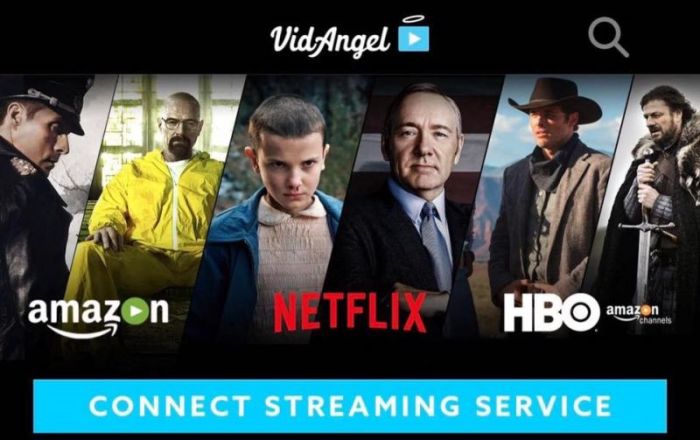Family groups pressure Congress to legalize VidAngel media filter service after Hollywood lawsuit

The nation’s lead family television watchdog is concerned that Congress may squander an opportunity to give parents more control over the media their children consume at home as Hollywood interests stand in the way of bipartisan, evangelical-backed legislation to give them the ability to do so.
The Parents Television Council, a nonpartisan nonprofit devoted to protecting families from graphic sex, violence and profanity in the media, is pressuring Congress to vote on the Family Movie Act Clarification Act before the current session comes to an end in the coming weeks.
The next three weeks, the watchdog believes, will be the last true opportunity to pass the legislation that would allow parents to use technologies such as VidAngel or ClearPlay to filter graphic and sexual scenes and language from movies and television shows streamed through services like Netflix, Hulu or Amazon Prime.
Although the Family Movie Act of 2005 legalizes such technology for movies and videos played on DVD players, a group of Hollywood movie studios sued in “Hollywood-friendly courts” in Southern California to get a ban on filtering technology from being used on programs streamed over the internet.
“Hollywood studios are spending hundreds of thousands of dollars to kill it. They have spent maybe millions of dollars in legal fees by bankrupting companies with legal threats of piracy,” PTC President Tim Winter told The Christian Post on Wednesday. “They claim this is copywriting infringement but they made those same claims with the DVDs and lost there.”
H.R.6816 was introduced by Florida Republican Rep. Mia Love in September following a Ninth Circuit Court ruling in August against an appeal filed by filtering company VidAngel, which shut down in 2016 due to the legal pressure applied by Disney and other studios.
The latest legislation would simply update the 2005 legislation to legalize filtering services on streaming platforms in addition to DVDs. According to Winter, the bill would bring the Family Movie Act “into the 21st Century.”
“We are hoping that Congress, just like they did in 2005 with a bipartisan passing of the bill signed into law by [George W.] Bush 43, we hope there will be bipartisanship here,” Winter said. “We also know that the clock is ticking on this lame-duck session. I am told that Disney and other studios spent huge lobbying trying to kill this bill before it was introduced.”
The bill is strongly supported by the Protect Family Rights Coalition, which is headed by the former CEO of ClearPlay. According to the coalition, H.R. 6816 was introduced by Love after a plea from prominent faith-based leaders, including Tony Perkins of the Family Research Council and James Dobson of Family Talk radio.
Other notable supporters of the bill include Maryland pastor Harry Jackson, former San Diego megachurch pastor Jim Garlow, Ted Baehr of the Christian Film and Television Commission, and former Ohio Congressman Bob McEwen.
“The proposed update defends the rights of families to filter when using authorized streaming services, like Netflix and Amazon, and without sacrificing studio revenue or violating the Copyright Act,” the coalition’s executive director, William J. Aho, wrote in a June 2017 letter, which was endorsed by the other leaders, to Speaker of the House Paul Ryan. “We are asking the House to pass legislation that simply clarifies that families have the right to filter streamed movies, for private viewing, without interference.”
Winter told CP that claims that filtering services are engaging in some form of piracy or copyright infringement are ludicrous.
“There is no derivative work that is being edited and resold to anybody else,” Winter said. “It is only when it streams and plays back on my device. So there is no derivative work that is being pirated or resold. The [studios] are actually gaining money.”
Winter said that studios should appreciate the fact that filtering services will enable more families to watch their programs when they wouldn’t otherwise.
“The only thing we can figure for why Hollywood would try to kill technology that would bring in more revenue and more viewers and customers is that their agenda of pushing graphic content is even more important than the cash flow,” Winter opined.
With the current Congress coming to a close at the end of the year, Winter is not optimistic that the bill could get passed in the next Congress.
“We fear that if it doesn’t pass in this session, it is unlikely to pass or even be introduced in the future,” he contended. “There is a lot of financial lobbying pressure. The new Congress in January is going to have to pick and choose what they are going to move forward on. I don’t see that Congress moving forward with this. I am hopeful that those who felt the scorn of Hollywood in the campaign in this last election might take this moment to do something for families.”
"It seems like a no-brainer and the simplicity of it makes it possible before they adjourn for the year."
Follow Samuel Smith on Twitter: @IamSamSmith
or Facebook: SamuelSmithCP





























